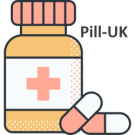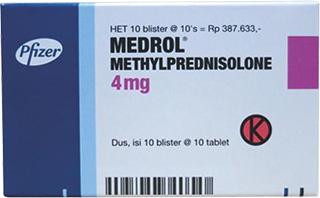The glucocorticoid drug Medrol is a first-line therapy for diseases of the musculoskeletal system, respiratory system and many other conditions.
Medrol is a drug with proven efficacy.
Medrol is an immediate anti-shock therapy for acute allergic reactions.
Medrol is an essential aid in suppressing the immune response to autoimmune diseases.
To buy Medrol in United Kingdom you don’t have to go to a street pharmacy. You can buy Medrol right now – without a prescription, at an affordable price and with delivery in UK.
Where To Buy Medrol In United Kingdom
Where to buy Medrol? You can order Medrol now on our online pharmacy site. Your purchase will be cost-effective and here’s why:
- Here you can buy without a prescription;
- Completely anonymous;
- With a flexible discount system, which means at a convenient price;
- Fast delivery within Spain;
- With a ‘cash on delivery’ service.
Medrol No Prescription Online Pharmacy
Do you really not need a prescription?
Yes, you do. You can get Medrol without a prescription from an online pharmacy by placing an order on our site.
Medrol Cheap Price
Buying Medrol tablets in our online pharmacy is cheap and advantageous.
Pay attention to the discounted price range: the more pills there are in the package, the lower the price will be.
Anonymity When Buying Medrol
You have already filled in the order form, but you are still undecided about your final purchase? Then you need to discover all the advantages of buying online.
Well, it’s very easy. Buying Medrol online is fast, anonymous and cash on delivery.
What is Medrol
Medrol tablets contain a highly effective substance, methylprednisolone, which belongs to the steroid hormones of the corticosteroid subclass. This medicine is extremely effective as a first-line and emergency therapy in shock reactions, including allergic reactions, as well as therapy in disorders of the musculoskeletal system, disorders of the respiratory system and traumatic conditions.
An observation: methylprednisolone outperforms hydrocortisone by a factor of 5 in terms of anti-inflammatory activity; it has virtually no mineralocorticoid activity and therefore does not contribute to sodium retention in the body, so it does not cause swelling or an increase in blood pressure.
Methylprednisolone is available under several trade names, including Medrol.
The most common forms are Medrol 4 mg tablets and Medrol 16 mg tablets.
Effects of Medrol
The drug is prescribed for the following conditions:
- Scleroderma, periarteritis nodosa, dermatomyositis, rheumatoid arthritis and other systemic connective tissue diseases.
- Gout and psoriatic arthritis, osteoarthritis (including post-traumatic osteoarthritis), polyarthritis (including senile polyarthritis), brachial-lobar periarthritis, ankylosing spondylitis (Behterew’s disease), juvenile arthritis, adult Still’s syndrome, bursitis, non-specific tenosynovitis, synovitis and epicondylitis, as well as other acute or chronic inflammatory joint diseases;
- Acute rheumatism, rheumatic carditis, minor chorea;
- bronchial asthma or asthmatic conditions
- acute and chronic allergic diseases including, but not limited to: allergic reactions to drugs and food, serum sickness, urticaria, allergic rhinitis, Quincke’s oedema, drug exanthema, pollinosis
- skin diseases of variable aetiology: vesicles, psoriasis, eczema, atopic dermatitis (neurodermatitis), contractile dermatitis (also with large cutaneous areas), toxidermia, seborrhoeic dermatitis, exfoliative dermatitis, toxic epidermal necrolysis (Lyell’s syndrome), bullous dermatitis herpetiformis, Stevens-Johnson syndrome
- Allergic eye diseases, including allergic conjunctivitis;
- Inflammatory eye diseases, including sympathetic ophthalmia, optic neuritis;
- Primary or secondary adrenal insufficiency and congenital adrenal hyperplasia;
- Kidney diseases of autoimmune origin (including acute glomerulonephritis);
- Nephrotic syndrome;
- Subacute thyroiditis;
- Diseases of the blood and haemopoietic system: agranulocytosis, panmyelopathy, autoimmune haemolytic anaemia, leukaemia and others.
- interstitial lung diseases
- tuberculous meningitis, pulmonary tuberculosis, aspiration pneumonia, berylliosis
- berylliosis, Leffler’s syndrome
- lung cancer (in combination with cytostatics);
- multiple sclerosis, even in the acute phase;
- ulcerative colitis, Crohn’s disease, localised enteritis;
- hepatitis;
- hypoglycaemic states;
- myeloma disease:
- including a number of other diseases of different aetiology, acute and chronic.
Dosage
The recommended starting dose of Medrol may vary between 4 mg and 48 mg per day.
Once therapeutic effect is achieved, the dose is gradually reduced.
In less severe conditions (including allergic skin reactions, chronic musculoskeletal disorders), the therapeutic dose is 4 mg Medrol per day (1 tablet).
In severe conditions (multiple sclerosis, cerebral oedema), a high dose of 7 mg Medrol per 1 kg body weight per day may be administered.
In children, the appropriateness of the dose is determined by the doctor.
Use
Medrol tablets are taken orally with a small amount of water immediately after a meal.
If the dose is minimal and intended for once-daily administration, the medicine should be taken first thing in the morning, between 7 and 10 a.m. The dose should be taken at least once a day. A clear schedule should be established, with a fixed time for taking the medication.
The highest daily dose should be divided into 2-4 doses, with most of the daily dose taken in the morning, at the set time.
Contraindications
There are several contraindications to the use of Medrol, so it is advisable to consult a doctor.
Contraindications include: acute gastrointestinal diseases; post-vaccination period; parasitic and infectious diseases of viral, fungal or bacterial nature (including herpes, systemic mycoses); immunodeficiency states; severe chronic heart failure; diabetes; obesity grade III-IV; renal and hepatic insufficiency, etc.
Medrol is used during pregnancy and lactation only if absolutely necessary.
Side effects of Medrol
If up to 6 g per day is taken, the risk of side effects is considerably reduced.
With prolonged use the following side effects may occur: nausea, vomiting, pancreatitis, steroid diabetes, abdominal pain, diarrhoea, dizziness, headache, arrhythmia, increased intracranial pressure and other symptoms.
If you notice any undesirable symptoms, you should stop taking the medicine and contact your doctor immediately.
Frequently Asked Questions
How Many Times A Day
The high daily dose should be divided into 2 to 4 doses. The highest daily dose should be taken immediately after waking up, preferably between 7 and 10 am.
The lower dose can be taken once a day, at a strictly scheduled time, preferably between 7 and 10 am.
When it starts to work
Medrol works quickly and effectively. However, it is necessary to distinguish the cause of application: if it is back pain in the context of rheumatoid arthritis, the patient will experience prolonged relief after a few days of taking the medicine.
If the patient takes the medicine in the presence of an allergic reaction, the tablets will have an immediate effect.
How Many Days to Take
The duration of treatment will be determined by the doctor, depending on the form and severity of the disease.
What Not to Eat When Using Medrol
As with other hormones taken by mouth, a diet must be followed with Medrol. This prevents weight gain and keeps the gastric mucosa in optimal condition.
Before or After Meals
Medrol should be taken immediately after a meal and at the same time. This allows the body to assimilate the medication more effectively.
Medrol&Bentelan&Deltacortene
Medrol should not be confused with Bentelan or Deltacortene.
Yes, they are all hormonal (corticosteroids), but their active ingredients differ in terms of indications, side effects and pharmaceutical formulations.


